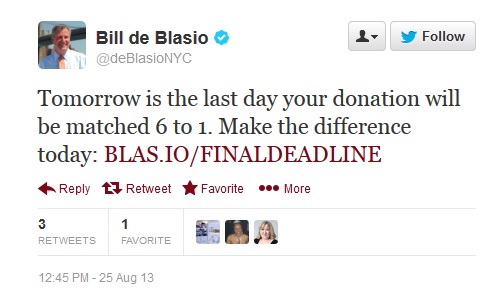Why (Behavioral) Science Matters
Almost a month ago Bill de Blasio, Democratic nominee for NYC mayor, tweeted something that made me angry. If I were to donate to his primary campaign, he (or a 19 year old unpaid intern) proclaimed, my contribution would be matched 6 to 1. So now we know that de Blasio — unlike Barack Obama — is not running his campaign according to the latest research findings.

Bad economics from a mayoral hopeful. (Screenshot by the author.)
Political fundraising has long been an inexact science, so in the mid 2000s, two economists partnered up with a US non-profit and ran an experiment about what works best when a charity is raising money. Specifically, they looked at the effect of matching funds. Are people actually more likely to donate if their donations are matched? Their findings were surprising.
It turns out that offering a 1:1 match made people more likely to donate and raised the total amount of money that the charity raised. But higher matches — which essentially give donors more bang for their charitable buck — have no additional effect. 6 to 1 sounds high, but the evidence demonstrates that a one-to-one match would have worked just as well and so five sixths (83%) of that donor money is being wasted on a match when it could just go to general operating expenses.
That’s right, folks: a political candidate brazenly ignored a six-year-old paper from the American Economic Review. Pitchforks and torches would not be an over-reaction.
No, the real reason this matters is as a signal. Every organization on the planet, whether a political campaign, a business, or a government agency, at some level needs to influence people’s behavior. Traditionally this has been done based on intuition but now we can use state-of-the-art scientific knowledge about behavior. Hire a chief behavioralist, or just someone whose life was changed by Thinking Fast and Slow. It would have taken a day, tops, for someone to review the literature on the science of fundraising, but no — instead the campaign was guided by hoary rules of thumb that have never been exposed to the scientific method (tagline: “the known universe’s best tool for knowledge accumulation”).
Of course research matters elsewhere as well. From seawalls to transit expansion to services for the indigent, every policy decision that de Blasio will have to make as mayor can be research-informed — and good decisions are those that use prior knowledge intelligently. If de Blasio doesn’t see science as important for his campaign, if he can’t see how it would help him win election to office, what are the odds that he will use it to make better policy? Pick your political candidates based on how much they strive to use the best possible information to make their decisions — vote for fans of scientific research.